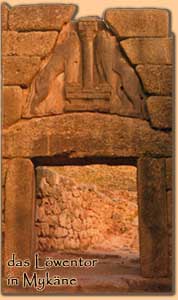In 1953, the German pastor Juergen Spanuth went on an expedition in the
North Sea in order to find Atlantis on Helgoland. In a depth of 13,7 metres
divers found parallel stone walls that were coloured red, black and white.
Interestingly enough, the walls in Poseidonis, capitol of Atlantis, were
coloured the same way. Spanuth thinks that these walls are remnants of the
Atlantean civilization and supports his thesis by pointing to an artwork in
the Egyptian temple of Medinet Habu. This artwork shows the “seafaring
people“ fighting with the Egyptian forces on the sea. The seafarers‘ forces
look like ancient Wikings with their typical horned helmets. 
But is this the truth? That is open to discussion, just as in the case of
the theories about Atlantis. But let us have a look at Egypt in the age of
these seafaring people. Around 1200 BC, the seafarers are supposed to have
assaulted the coastal areas of Egypt for a duration of 200 years. Scholars
believe that these seafarers were pirates, allies of the Philisters who were
waging a war with Egypt at that time.
Another account suggests the Teutons (Urnenfeld culture). Starting from
the southern part of Germany, they advanced their southbound spread around
1200 BC. The spread of the Urnenfeld culture had a considerable effect on
the Mediterranean area: connected with Greece and neighbouring countries,
the Mycenaean culture was doomed to perish when the Teutons invaded their
country. An equal fate awaited the mysterious Hittites.
Should these circumstances add a new perspective to Plato’s writings? I
would say so. Let us have another look at the “Timaeus“:
| “(...) This vast power, gathered
into one, endeavoured to subdue at a blow our country and yours and the
whole of the region within the straits;(...)“ |
All nations in the Mediterranean area were surprised by the invasion from
the north. The Teutons or Celts also had a huge fleet at their disposal,
enabling them to easily overrun the Mediterranean area. Some nations were in
a position to defend themselves against the invasions, as for example the
Egyptians – who brought forth the myth of Atlantis.
| “(...) you do not know that there
formerly dwelt in your land the fairest and noblest race of men which ever
lived, and that you and your whole city are descended from a small seed or
remnant of them which survived.(...)“ |
Did the Egyptinas mean the Mycenaean culture, predecessor of the Greek
culture? Did they think that a small tribe survived and founded the Greek
lineage anew? History books say that the Greek culture commenced around 1500
BC.
| “(...) She was pre-eminent in
courage and military skill, and was the leader of the Hellenes. And when the
rest fell off from her, being compelled to stand alone, after having
undergone the very extremity of danger, she defeated and triumphed over the
invaders, and preserved from slavery those who were not yet subjugated, and
generously liberated all the rest of us who dwell within the pillars.(...)“ |
This might invite the inference that the Egyptians state how the Greek
people got back on their feet after the extermination of the seafarers. And
what is more, the hint in the dialogue that the Greek people repeatedly
learnt how to write proves to be true when taking into account the fact that
the Greek people took over the script of the Phoenicians around 1200 BC.

 MYKENE MYKENE
H. Schliemann (1822-1890 AD), discoverer of Troy, also found Mycenae and
thus a new culture. Until then, the Mycenaean culture had only been subject
to myths. Schliemann was determined to discover the tomb of the Homeric
Agamemnon but failed. The Mycenae he found was too young to be the one
described by Homer.
The same situation occured with Troy and the treasures of Priamos for the
treasures he found (which disappeared after World War II) were too old to be
the Homeric ones.
In any case, Schliemann was the forerunner of mythical treasure hunt. He
will be forever connected with the legends of Homer.

Although there is quite some circumstancial evidence for an Atlantean
empire in Central Europe, some questions remain:
the dates for the doom given in the
legend of Atlantis decrease by a factor of 10. Hence, the volcanic
eruption on the island of Thera in 1200 BC would become a suitable horror
scenario.
according to the dialogue, the empire
was situated west of the Pillars of Hercules. Both the Celts and Teutons
lived in North Europe.
the domestic genera of animals on the
island of Atlantis did not exist in North Europe.
Just as in this case, Atlantis remains an absorbing myth that needs to be
reregarded from different viewpoints as brought forth by continuing research.
Nothing but puzzles.
|